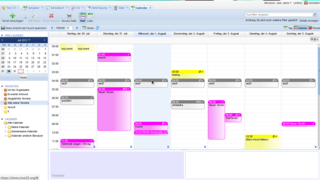
An operating system (OS) is system software that manages computer hardware and software resources, and provides common services for computer programs.
Shareware is a type of proprietary software that is initially shared by the owner for trial use at little or no cost. Often the software has limited functionality or incomplete documentation until the user sends payment to the software developer. Shareware is often offered as a download from a website. Shareware differs from freeware, which is fully-featured software distributed at no cost to the user but without source code being made available; and free and open-source software, in which the source code is freely available for anyone to inspect and alter.

The Mythical Man-Month: Essays on Software Engineering is a book on software engineering and project management by Fred Brooks first published in 1975, with subsequent editions in 1982 and 1995. Its central theme is that adding manpower to a software project that is behind schedule delays it even longer. This idea is known as Brooks's law, and is presented along with the second-system effect and advocacy of prototyping.

Calendar is a personal calendar app made by Apple Inc. for its macOS, iOS, iPadOS, and watchOS operating systems. It offers online cloud backup of calendars using Apple's iCloud service, or can synchronize with other calendar services, including Google Calendar and Microsoft Exchange Server.
In computer science, message queues and mailboxes are software-engineering components typically used for inter-process communication (IPC), or for inter-thread communication within the same process. They use a queue for messaging – the passing of control or of content. Group communication systems provide similar kinds of functionality.
Software prototyping is the activity of creating prototypes of software applications, i.e., incomplete versions of the software program being developed. It is an activity that can occur in software development and is comparable to prototyping as known from other fields, such as mechanical engineering or manufacturing.
Push technology, also known as server Push, refers to a communication method, where the communication is initiated by a server rather than a client. This approach is different from the "pull" method where the communication is initiated by a client.

plan is a calendar and day planner program for the X Window System based on the Motif widget set. plan is free software released under a custom permissive license.
Appointment scheduling software or meeting scheduling tools allows businesses and professionals to manage appointments and bookings. This type of software is also known as appointment booking software and online booking software.

Google Calendar is a time-management and scheduling calendar service developed by Google. It was created by Mike Samuel as part of his 20% project at Google. It became available in beta release April 13, 2006, and in general release in July 2009, on the web and as mobile apps for the Android and iOS platforms.
A discrete-event simulation (DES) models the operation of a system as a (discrete) sequence of events in time. Each event occurs at a particular instant in time and marks a change of state in the system. Between consecutive events, no change in the system is assumed to occur; thus the simulation time can directly jump to the occurrence time of the next event, which is called next-event time progression.
The Sun Java System Calendar Server was Sun's calendar (scheduling) server. The currently available version is 6.3 which is now part of the Sun Java System Communications Suite.
In software engineering, graphical user interface testing is the process of testing a product's graphical user interface (GUI) to ensure it meets its specifications. This is normally done through the use of a variety of test cases.

A digital calendar is a collaborative or personal time management software with a calendar that can be used to keep track of planned events. The calendar can also contain an appointment book, address book or contact list. Common features of digital calendars are that users can:
In software engineering, a software development process or software development life cycle (SDLC) is a process of planning and managing software development. It typically involves dividing software development work into smaller, parallel, or sequential steps or sub-processes to improve design and/or product management. The methodology may include the pre-definition of specific deliverables and artifacts that are created and completed by a project team to develop or maintain an application.
The early 1990s saw the advent of online diary planners, digital tools that help users keep track of upcoming meetings and events. Users may be executives, event managers, doctors, students, and others. Although the idea of keeping a record of events is not new, digital planners allowed for those plans to be shared on the internet. The desire for effective online organizers and personal information managers (PIMS) has been growing. The web-based Filofax initially satisfied users' organizing needs, followed by ACT!, Time and Chaos, and Microsoft Outlook.

Google Now was a feature of Google Search of the Google app for Android and iOS. Google Now proactively delivered information to users to predict information they might need in the form of informational cards. Google Now branding is no longer used, but the functionality continues in the Google app and its discover tab.

Cortana was a virtual assistant developed by Microsoft that used the Bing search engine to perform tasks such as setting reminders and answering questions for users.
Holiline Reminder is a free software calendar program for Windows.







